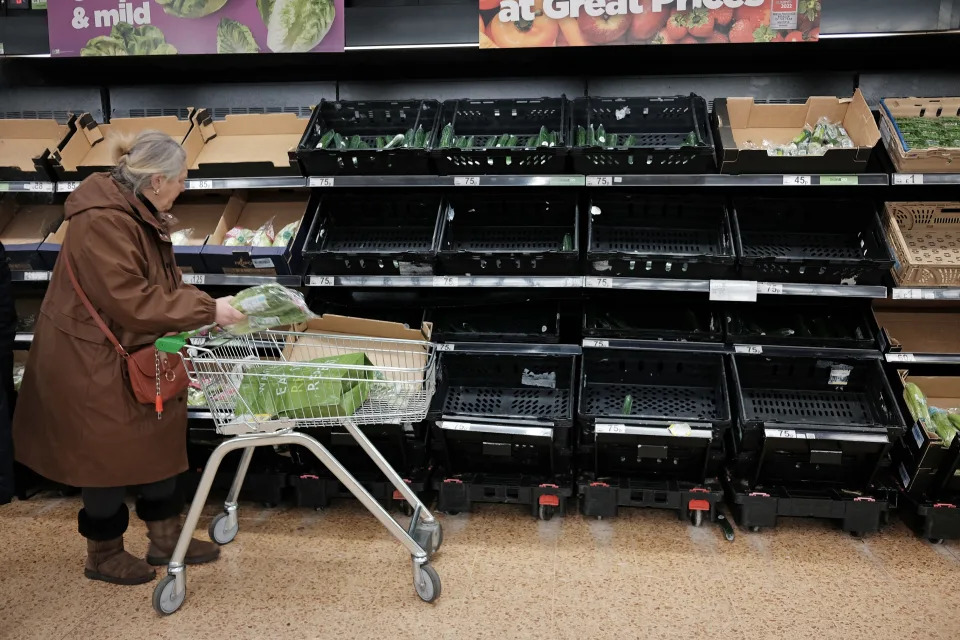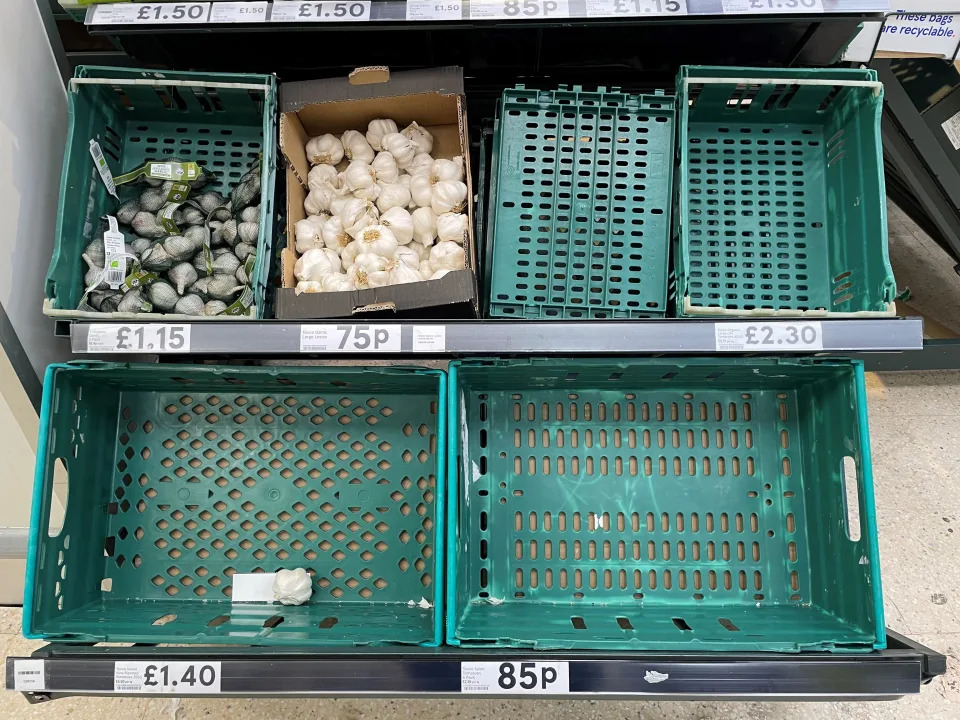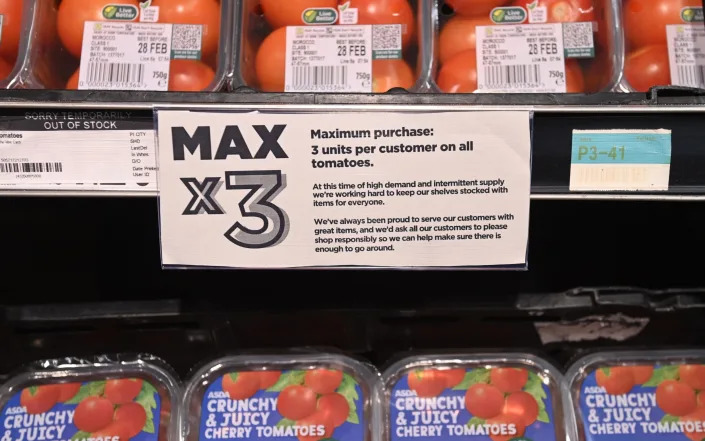LET THEM EAT TURNIPS SAYS MINISTER
UK Food shortages: Government accused of 'turning a blind eye' to empty shelves
Connor Parker
Thu, 23 February 2023

Many people have reported seeing empty fruit and vegetable shelves across the country. (PA)
The government has been accused of "turning a blind eye" to the food shortages impacting supermarkets across the UK.
In recent days several supermarket chains including Tesco and Morrisons have restricted the sale of tomatoes, cucumbers and some other fruit and vegetables.
Speaking in the House of Commons on Thursday, Liberal Democrat MP Wera Hobhouse said: "The government seems content in turning a blind eye to the urgency of the issue altogether."
She joined her party in calls for a Cobra [the government's civil contingencies committee] meeting on the issue.
Liberal Democrat spokesperson Christine Jardine said: "People are rightly alarmed about the chronic shortage of fruit and vegetables in our shops, but it seems the government has no urgent plan to fix it.
"This government has created chaos in the economy, an NHS on its knees, now they’re responsible for worsening food shortages through their failure to back British farming.
Read more: Food shortages: Fruit and veg industry 'hurt horribly by Brexit', ex-supermarket chief warns
"We need an urgent Cobra meeting, together with food experts, supermarkets and farmers, to hammer out an urgent solution to this crisis."
Environment secretary Therese Coffey defended the government in the Commons, and said she had been informed by industry experts that it was a temporary issue that should be resolved in two to four weeks.
Coffey blamed the unseasonal weather in Spain and north Africa, where much of Europe's tomatoes are grown over winter, for the crisis.
Responding to an urgent question, Coffey said: "I am led to believe by my officials, after discussion with industry and retailers, we anticipate the situation will last about another two to four weeks."

Empty tomato trays at a Tesco Express. (PA)
Coffey said other European countries had been facing similar issues, but MPs in the Commons contested this.
SNP MP Amy Callaghan said: "There are no reported shortages of food in France, Germany and other European net-food importers.
"Isn’t this a problem created by inward-looking little England, and this British government?"
Coexphal, an association of Spanish fruit and vegetable companies, told the Guardian tomato production was down 22% year on year, with cucumber production down 21%.
Connor Parker
Thu, 23 February 2023
Many people have reported seeing empty fruit and vegetable shelves across the country. (PA)
The government has been accused of "turning a blind eye" to the food shortages impacting supermarkets across the UK.
In recent days several supermarket chains including Tesco and Morrisons have restricted the sale of tomatoes, cucumbers and some other fruit and vegetables.
Speaking in the House of Commons on Thursday, Liberal Democrat MP Wera Hobhouse said: "The government seems content in turning a blind eye to the urgency of the issue altogether."
She joined her party in calls for a Cobra [the government's civil contingencies committee] meeting on the issue.
Liberal Democrat spokesperson Christine Jardine said: "People are rightly alarmed about the chronic shortage of fruit and vegetables in our shops, but it seems the government has no urgent plan to fix it.
"This government has created chaos in the economy, an NHS on its knees, now they’re responsible for worsening food shortages through their failure to back British farming.
Read more: Food shortages: Fruit and veg industry 'hurt horribly by Brexit', ex-supermarket chief warns
"We need an urgent Cobra meeting, together with food experts, supermarkets and farmers, to hammer out an urgent solution to this crisis."
Environment secretary Therese Coffey defended the government in the Commons, and said she had been informed by industry experts that it was a temporary issue that should be resolved in two to four weeks.
Coffey blamed the unseasonal weather in Spain and north Africa, where much of Europe's tomatoes are grown over winter, for the crisis.
Responding to an urgent question, Coffey said: "I am led to believe by my officials, after discussion with industry and retailers, we anticipate the situation will last about another two to four weeks."
Empty tomato trays at a Tesco Express. (PA)
Coffey said other European countries had been facing similar issues, but MPs in the Commons contested this.
SNP MP Amy Callaghan said: "There are no reported shortages of food in France, Germany and other European net-food importers.
"Isn’t this a problem created by inward-looking little England, and this British government?"
Coexphal, an association of Spanish fruit and vegetable companies, told the Guardian tomato production was down 22% year on year, with cucumber production down 21%.
Therese Coffey said on Thursday she believed the food shortages would be a temporary issue. (PA)
They said a recent cold snap, along with higher production costs and viruses had impacted production.
But other farmers have said they have not seen a decline in production and said the UK's issues were more to do with logistics and transport than a lack of supply.
A representative of another Spanish farming association, Asaja, told the paper: "Things are normal so far this season so I don’t know if it’s more a problem of UK logistics since the Brexit regulations came into effect.
"There’s enough produce to supply the market and the vegetable season is happening pretty normally.”
Some analysts based in the UK have pointed to Brexit as the problem, with images shared on social media showing supermarkets on the content full of fresh produce.
The BBC reported that Ireland, which is in the EU, is also having problems.
Rationing is back because we failed to learn the lessons of Covid
Ben Marlow
Ben Marlow
THE TELEGRAPH
Thu, February 23, 2023

UK supermarkets have introduced limits on fruit and veg amid a supply shortage - NEIL HALL/EPA-EFE/Shutterstock
For Theresa May it was Brexit, while partygate finished Boris Johnson, and Liz Truss was undone by a spectacular revolt in the bond markets. Rishi Sunak may one day look back at this week's National Farmers' Union conference in Birmingham as the moment when it became clear that the Tories’ time in charge was well and truly over.
The two-day jamboree had got off to a wobbly start for the Government, with farming minister Mark Spencer facing tough questions. Sunak himself hardly helped with a brief appearance by video link where he laughably claimed that his participation in “the early morning milking in Wensleydale” had left him with a greater empathy for the plight of Britain’s farmers.
But it was the entrance of Thérèse Coffey's refusal to accept that the Government was in any way to blame for the current food shortages that left the audience understandably seething. There may be fewer raspberries to go around at the minute, but this was the Environment Secretary blowing a big one back at angry farmers. “We can’t control the weather in Spain,” Coffey declared, perhaps half-wishing she could be magically teleported there, away from audible boos.
The NFU’s main gripe is that if vegetable growers hadn’t been excluded from the Government’s energy support programme then the sprawling greenhouses of Kent wouldn’t have been left half-empty and we wouldn’t have seen a return to supermarket rationing. Coffey blames the Spanish climate.
There may be some truth to that, though images of fully stocked greengrocers on the continent suggest otherwise. But a more astute politician would have acknowledged that more could be done to help instead of seeking to deflect blame with glib remarks about the weather. Fierce criticism from former Sainsbury’s boss Justin King won’t have helped her case.
Yet there is a much bigger problem, which is that national resilience has disappeared from the political agenda again when in fact it should have been front and centre of government policy the second the pandemic erupted.
The Covid outbreak was quick to expose numerous weaknesses in Britain’s self-sufficiency. Though the national vaccine programme was a stunning success in many ways, the NHS was only really able to rely on the homegrown Oxford-AstraZeneca jab at the beginning. As the vaccine effort ramped up, additional supplies were needed from India, and it was soon clear that a widely threatened European blockade risked the delivery of second doses of the Pfizer jab.
Then as the world emerged from lockdown, our reliance on overseas partners was laid bare again as demand for precious materials and microchips outstripped stocks. The ensuing supply shock led to acute shortages of popular consumer goods, essential components, and vital raw materials, and the consequences of this resulting ruinous new inflationary era are still being felt by families on almost every front despite the efforts of central bankers.
The war in Ukraine served as another serious warning, this time of our over-dependence on energy supplies, and not just from unreliable foreign despots but allies closer to home too. Amid all the focus on Putin’s weaponisation of Russian oil and gas, it is easy to forget that France threatened to shut down Jersey’s power supply in response to a row over post-Brexit fishing rights.
But it was the emergence of big gaps on supermarket shelves within weeks of the pandemic erupting that should have prompted a national effort to bolster resilience. The creation of the Covid Recovery Commission, led by Tesco chairman John Allan, was the right idea. From the rubble of the coronavirus, there was a huge opportunity for a reinvention that made us less vulnerable to complex yet fragile global supply chains and the whims of unstable regimes.
But much like Brexit, it was squandered, perhaps because the Government has decided that such a move is incompatible with the free market principles it espouses outside of the European Union. Yet as Allan pointed out, the merits or otherwise of globalisation aren't the issue - shortages are becoming more acute and they demand a proper response from Westminster. Besides, it is perfectly possible to diversify the supply chain at the same time as offering protection and support for UK farmers.
We are far too reliant on a small number of exporters. In the winter months the UK gets around 95pc of its tomatoes and 90pc of its lettuces, most from Spain and north Africa. The 90-hectare Thanet Earth project, which produces 450m salad vegetables a year, is impressive but Britain could probably do with many more industrial agriculture complexes like it.
Meanwhile, there are millions of other farmers toiling away in the fields who say they have been left distinctly poorer by the end of EU subsidies, as well as the spiralling costs of energy, fuel, fertiliser and animal feed, which has prevented them from growing more. Excluding vegetable producers from the energy support scheme now looks like an act of stupidity but farmers have been warning for months that the UK is “sleepwalking” into a food crisis.
The failure to learn the lessons of Covid and take food security more seriously is now coming back to bite the Government in such a big way that the Prime Minister effectively stands accused of stealing the nation’s cucumbers.
Farmers are supposed to be “true blues”. If the Tories lose the support of the countryside, they can kiss goodbye to the next election.
Thu, February 23, 2023

UK supermarkets have introduced limits on fruit and veg amid a supply shortage - NEIL HALL/EPA-EFE/Shutterstock
For Theresa May it was Brexit, while partygate finished Boris Johnson, and Liz Truss was undone by a spectacular revolt in the bond markets. Rishi Sunak may one day look back at this week's National Farmers' Union conference in Birmingham as the moment when it became clear that the Tories’ time in charge was well and truly over.
The two-day jamboree had got off to a wobbly start for the Government, with farming minister Mark Spencer facing tough questions. Sunak himself hardly helped with a brief appearance by video link where he laughably claimed that his participation in “the early morning milking in Wensleydale” had left him with a greater empathy for the plight of Britain’s farmers.
But it was the entrance of Thérèse Coffey's refusal to accept that the Government was in any way to blame for the current food shortages that left the audience understandably seething. There may be fewer raspberries to go around at the minute, but this was the Environment Secretary blowing a big one back at angry farmers. “We can’t control the weather in Spain,” Coffey declared, perhaps half-wishing she could be magically teleported there, away from audible boos.
The NFU’s main gripe is that if vegetable growers hadn’t been excluded from the Government’s energy support programme then the sprawling greenhouses of Kent wouldn’t have been left half-empty and we wouldn’t have seen a return to supermarket rationing. Coffey blames the Spanish climate.
There may be some truth to that, though images of fully stocked greengrocers on the continent suggest otherwise. But a more astute politician would have acknowledged that more could be done to help instead of seeking to deflect blame with glib remarks about the weather. Fierce criticism from former Sainsbury’s boss Justin King won’t have helped her case.
Yet there is a much bigger problem, which is that national resilience has disappeared from the political agenda again when in fact it should have been front and centre of government policy the second the pandemic erupted.
The Covid outbreak was quick to expose numerous weaknesses in Britain’s self-sufficiency. Though the national vaccine programme was a stunning success in many ways, the NHS was only really able to rely on the homegrown Oxford-AstraZeneca jab at the beginning. As the vaccine effort ramped up, additional supplies were needed from India, and it was soon clear that a widely threatened European blockade risked the delivery of second doses of the Pfizer jab.
Then as the world emerged from lockdown, our reliance on overseas partners was laid bare again as demand for precious materials and microchips outstripped stocks. The ensuing supply shock led to acute shortages of popular consumer goods, essential components, and vital raw materials, and the consequences of this resulting ruinous new inflationary era are still being felt by families on almost every front despite the efforts of central bankers.
The war in Ukraine served as another serious warning, this time of our over-dependence on energy supplies, and not just from unreliable foreign despots but allies closer to home too. Amid all the focus on Putin’s weaponisation of Russian oil and gas, it is easy to forget that France threatened to shut down Jersey’s power supply in response to a row over post-Brexit fishing rights.
But it was the emergence of big gaps on supermarket shelves within weeks of the pandemic erupting that should have prompted a national effort to bolster resilience. The creation of the Covid Recovery Commission, led by Tesco chairman John Allan, was the right idea. From the rubble of the coronavirus, there was a huge opportunity for a reinvention that made us less vulnerable to complex yet fragile global supply chains and the whims of unstable regimes.
But much like Brexit, it was squandered, perhaps because the Government has decided that such a move is incompatible with the free market principles it espouses outside of the European Union. Yet as Allan pointed out, the merits or otherwise of globalisation aren't the issue - shortages are becoming more acute and they demand a proper response from Westminster. Besides, it is perfectly possible to diversify the supply chain at the same time as offering protection and support for UK farmers.
We are far too reliant on a small number of exporters. In the winter months the UK gets around 95pc of its tomatoes and 90pc of its lettuces, most from Spain and north Africa. The 90-hectare Thanet Earth project, which produces 450m salad vegetables a year, is impressive but Britain could probably do with many more industrial agriculture complexes like it.
Meanwhile, there are millions of other farmers toiling away in the fields who say they have been left distinctly poorer by the end of EU subsidies, as well as the spiralling costs of energy, fuel, fertiliser and animal feed, which has prevented them from growing more. Excluding vegetable producers from the energy support scheme now looks like an act of stupidity but farmers have been warning for months that the UK is “sleepwalking” into a food crisis.
The failure to learn the lessons of Covid and take food security more seriously is now coming back to bite the Government in such a big way that the Prime Minister effectively stands accused of stealing the nation’s cucumbers.
Farmers are supposed to be “true blues”. If the Tories lose the support of the countryside, they can kiss goodbye to the next election.
No comments:
Post a Comment